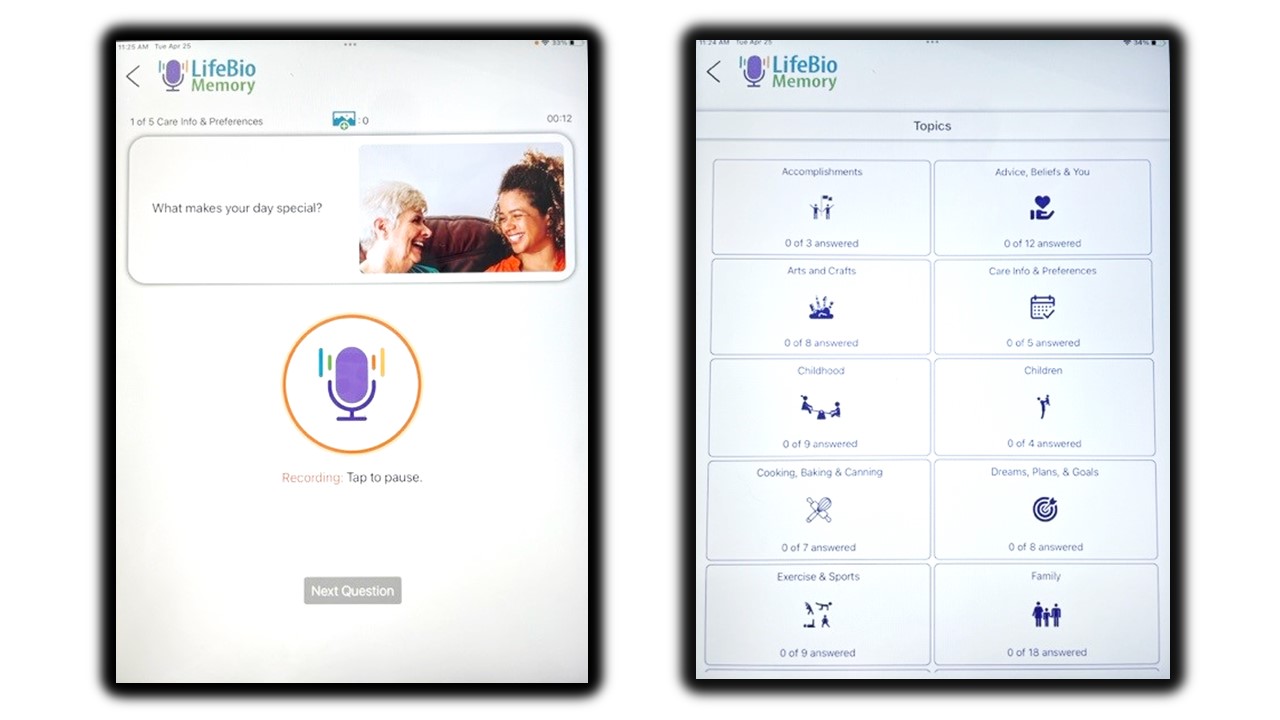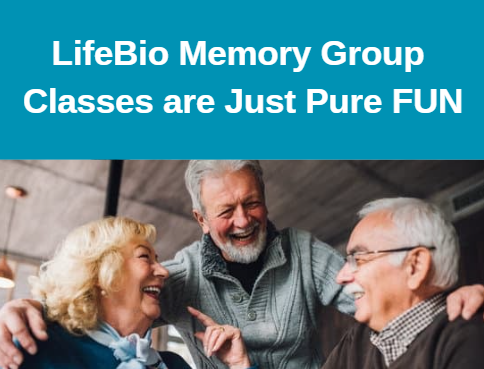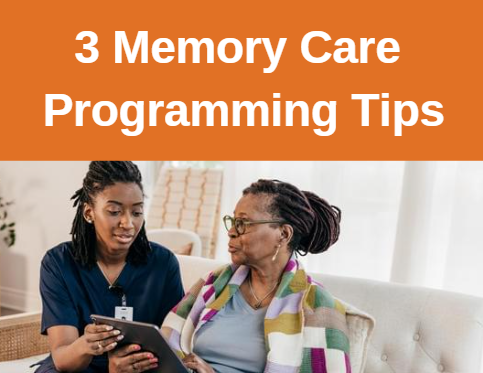The Birth of an Agetech App: The Importance of Research to Inform Development

I’d like to share a few details on the birth of our app, LifeBio Memory, and how research has revolutionized the agile software development process for us at LifeBio, Inc.
In mid-2020, LifeBio, Inc. won a federal Small Business Innovations Research (SBIR) grant (R44AG069566)** from the National Institute on Aging. We responded to the government’s interest in care innovations for people living with Alzheimer’s Disease and mild cognitive impairment. With pharma solutions still struggling to address this devastating disease, impacting more than 6 million Americans and 11 million unpaid caregivers too, potential non-pharma digital therapeutic interventions have garnered interest.
LifeBio took the foundation of what we had learned from multiple early, evidence-informed projects---and we envisioned the future of engagement using life stories with patients, clients, or residents. Studies on LifeBio’s life story work with Mayo Clinic, Iowa State University, Youngstown State University, University of Alabama, and the Benjamin Rose Institute on Aging were part of the journey that prepared us and gave us insight. (I learned about the SBIR program at a Mary Furlong event where Todd Haim spoke.)
As the SBIR grant commenced, our scrum master brought together the entire team of developers, AI data scientists, UX design experts, testing staff, the principal investigator (me), and others from operations or commercialization for daily 5-min standups. The intensity of these daily meetings pushed us FAST toward our mission. We were to build an interactive tool to foster communication between people living with dementia and their care partners using machine learning and artificial intelligence (AI). Summaries of the stories would be available to health care providers and caregivers to help them deliver effective and efficient care. A new UX (User Experience) for both iOS and Android devices was needed, and intense database work happened behind the scenes for the Minimum Viable Product (MVP) of LifeBio Memory to be ready to ship. It was quite the team effort and required an intense level of communication. If there was a concern, it had to be raised immediately so it could be solved.
Eureka! LifeBio Memory was born. This novel iOS / Android life story app gathers stories in the person’s own voice and processes the information using AI (machine learning for speech to text and for auto summarization). In the early MVP version, it provided just enough capabilities to get feedback and testing underway (very basic, but usable). iOS and Android tablets were prepared and shipped on time. Remarkably, the MVP shipped out within just four months of commencing the grant.
Focus group participants were recruited and 35 participated in five separate focus groups, with discussions led by Benjamin Rose Institute on Aging's experienced researchers. These focus groups happened successfully via Zoom even during COVID which was incredibly challenging---people were accessing both the app and Zoom to share. But they were able to do it. Focus groups included people 65+ living independently, people living with dementia, family caregivers, and staff members with various types of positions involved in senior care.
What did they have to say? A lot. Recordings were transcribed and there were tons of changes and ideas that focus group participants suggested. We learned how valuable focus group feedback could be---then we absolutely acted on it. Here are a couple of examples of things that focus groups wanted to know in our early first round of focus groups.
“Who is the user?” In the world of agetech software, there are multiple users (at least in our case). With LifeBio Memory, there can be the individual “Storyteller” (typically the senior, patient, client, resident), and there is the staff member, family member, or volunteer that could be assisting them in the life story capture process; it is helpful and fun to do it together. As a result of focus group feedback, the developers got to work. We had to clearly define the users and the process for user signup so that things would roll smoothly.
What else did we learn? It wasn’t enough to “tell” how to use LifeBio Memory, we had to “show” how to use it. In our thinking, just register the user and click the big purple button to record. A 2-minute training video helped them get started. So simple, right? NO. In fact, training had to vary a bit for individual “storytellers,” staff members, family members, and volunteers. In addition, there was a need to provide a dementia training module to help people know how important the life story is. More specifically, what did they want to know?
- How to prepare for a life story interview.
- How to approach someone to record life stories.
- How the precise questions are organized inside the app, with photo prompts too.
- How quick and easy the process could be (complete in as little as an hour!)
- How long they could talk (as long as they want!)
- How to successfully engage someone in a life story interview---listening skills, follow on questions, etc.
- What would be delivered and how to use the Life Story Book, Snapshot, and Action Plan in care delivery.
We lived, and learned, and listened. Focus group feedback, and review with the Benjamin Rose Institute on Aging’s talented research team, helped us move forward by creating new on-demand video training modules that covered what users needed to know to be successful. We recorded live sessions between people using the app to demonstrate the use of LifeBio Memory (big thank you to our video/photo shoot participants).
At this point, about a year had passed and now it was time for a second round of focus groups. We had taken ALL the many points that were listed in the first round and acted upon these using our Microsoft Azure DevOps system to track them and our agile/scrum process with daily standups. The tablets were re-loaded with the NEW version of LifeBio Memory, and they shipped out again to the same focus group users.
In the second round, the feedback was much more positive than the first time around. Brutal honesty is something we appreciated---with actual quotes from users provided by our research partner to us. A few examples of what happened in the second round of focus groups includes the staff wanting more information on using the app in transitions of care and how new business intelligence reporting could help them see more commonalities and differences in their population (ex. in a memory care /assisted living community for example) as more stories are captured. They enjoyed a deep dive into the vetted LifeBio Memory questions and photo prompts, reviewed in advance by dementia consultants Teepa Snow and Michelle Olson, and by educational consultants as well for clarity of content. Whether someone wanted to answer 10-20 questions or all 218 questions it was going to work. They enjoyed seeing the organized standard flow of questions and the new “Topics” area (34 topics) to dig in to one period of life experience more.
Signup and the recording process was now much clearer to focus group participants. More info was needed on uploading personal photos to complement the story--which was easily added to video training modules with a walkthrough on that. Some also wanted more information in the online videos on using the stories told in direct person-centered care. Once again, LifeBio’s staff worked together to process all these suggestions and prioritized them in DevOps. One by one, they were accomplished and incorporated into the final, production-ready release that made its debut in October 2021 at LeadingAge national conference.
After the app went into the field in production in October 2021, new sprints have kept the developers, data scientists, software testing crew, and commercialization crew all busy here. AI is still NEW, and so it continues to improve through training and new modeling to keep advancing the machine learning and auto-summarization capabilities. Internal testing is ongoing and results in constant alerts to developers of changes needed; they are then incorporated into the backlog and then moved into 2-week sprints. Projects with the app in use in California and Washington also provided real world feedback as interviewers onsite in nursing homes encountered scenarios that needed to be addressed in the software.
As of this writing in May 2022, Benjamin Rose Institute on Aging is in the midst of a clinical trial that may involve hundreds of assisted living, memory care residents in Cleveland and Columbus, Ohio community settings, to evaluate the impact of LifeBio Memory’s usage. With residents, measures such as the Mini Mental Status Examination (MMSE), depression measures, quality of life and other scales will be utilized. With staff, attitudes toward residents, job satisfaction, and other person-centered care measurements will be utilized (to name just a few). Feedback on the usefulness of the life story in care delivery will also be evaluated.
We cannot stress enough the power of having an experienced research team at Benjamin Rose Institute on Aging, some with decades of experience, who are focused on understanding the needs of aging individuals in various care environments (community settings and home too). Their field work experience matters and is making a difference. They are diligent and good at problem solving. It is certainly not easy to implement set research protocols and many challenges do arise in this type of clinical trial, but, in the long run, it is well worth it to have the clear evidence collected and analyzed. The clinical trial, when outcome data can be shared in the future, will certainly be of great interest to the LifeBio team. It will help us continue to evolve the software and it's usage as we grow to serve the large aging population in the U.S. and worldwide.
We are living in exciting times, and I am doing my best to document the extraordinary evolution of LifeBio Memory, supported by intense research, as it unfolds before my eyes. LifeBio's TEAM is incredibly talented, and I could not be prouder of the “birth” of this agetech app with my colleagues’ long hours, critiques, and brilliance. We are stronger as we work together.
From the simple tape recording of my grandmother---to a voice-powered, AI-powered application with precise questions and photo prompts driving the life story process and book/summary creation. Wow--I marvel at seeing the dream become a reality here at LifeBio, Inc. So so grateful to get to lead this extraordinary work that will change lives for the better.
We will continue our focus on the whole person and see strengths, wisdom, and a legacy unfolding. We will bring people together and start the best types of conversations that come from storytelling. This is a revolution in health care and senior care that is now underway. As Maya Angelou said, “Do the best you can until you know better. Then when you know better, do better.”
---- Beth Sanders, CEO, LifeBio, Inc. www.lifebio.com, 937-303-4574, bsanders@lifebio.com
_______________________________
**Research reported in this publication was supported by the National Institute on Aging of the National Institutes of Health under Federal Award Identification Number R44AG069566. The content is solely the responsibility of the authors and does not necessarily represent the official views of the National Institutes of Health.



